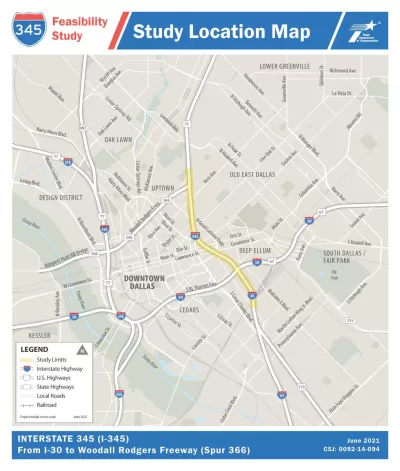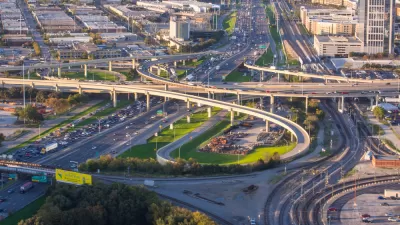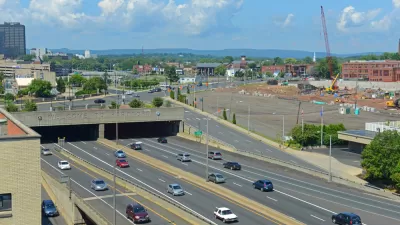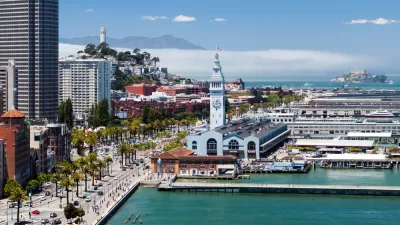Freeways have been removed before, but if the Texas Department of Transportation decides to tear down the I-345 freeway in Dallas, it would reflect a massive sea change in urban transportation planning.

"If you will excuse the pun, it looks like we may finally be approaching the end of the road — or at least the beginning of the end of the road — in deciding on a future for Interstate 345," writes Mark Lamster.
The Texas Department of Transportation (TxDOT) is wrapping up public comment on a feasibility study for the future of I-345 that includes an option to tear down the elevated freeway, reconnecting Downtown Dallas to the neighborhood of Deep Ellum.
As explained by Lamster, the feasibility study offers five possible alternatives: "repairing the road but leaving it unchanged; keeping it as an elevated highway but with a slimmer profile; depressing it into a trench (like U.S. 75) that can be bridged and decked; removing it altogether; and a hybrid combination of the trench and removal options."
According to Lamster, there was enough reaction to the feasibility study that TxDOT extended the deadline for public comment. We already know what advocates want—I-345 in Dallas made the 2019 "Freeways Without Futures" report published by the Congress for the New urbanism.
Discussions about what to do with the rapidly approaching obsolesce of the freeway's elevated structure has been ongoing since 2013, according to Lamster, and the tear-down alternative has emerged as a well considered planning alternative along the way:
The tear-out proposal, developed by the urban planner Patrick Kennedy, was a chance to re-knit the city while freeing up a huge swath of land for the kind of mixed-use, affordable development it desperately needed. Careful analysis of traffic patterns suggested that a new street system with boulevards and increased connectivity would avert serious congestion and massive delays, adding a mere five minutes to commutes.
Lamster voices his support for removal: "Of TxDOT’s five options, removal is the most logical, best option. Retaining the status quo at enormous cost would seem to be the worst possible choice."
FULL STORY: Dallas has 5 options for the future of I-345. Only one makes sense

Planetizen Federal Action Tracker
A weekly monitor of how Trump’s orders and actions are impacting planners and planning in America.

Maui's Vacation Rental Debate Turns Ugly
Verbal attacks, misinformation campaigns and fistfights plague a high-stakes debate to convert thousands of vacation rentals into long-term housing.

San Francisco Suspends Traffic Calming Amidst Record Deaths
Citing “a challenging fiscal landscape,” the city will cease the program on the heels of 42 traffic deaths, including 24 pedestrians.

Defunct Pittsburgh Power Plant to Become Residential Tower
A decommissioned steam heat plant will be redeveloped into almost 100 affordable housing units.

Trump Prompts Restructuring of Transportation Research Board in “Unprecedented Overreach”
The TRB has eliminated more than half of its committees including those focused on climate, equity, and cities.

Amtrak Rolls Out New Orleans to Alabama “Mardi Gras” Train
The new service will operate morning and evening departures between Mobile and New Orleans.
Urban Design for Planners 1: Software Tools
This six-course series explores essential urban design concepts using open source software and equips planners with the tools they need to participate fully in the urban design process.
Planning for Universal Design
Learn the tools for implementing Universal Design in planning regulations.
Heyer Gruel & Associates PA
JM Goldson LLC
Custer County Colorado
City of Camden Redevelopment Agency
City of Astoria
Transportation Research & Education Center (TREC) at Portland State University
Jefferson Parish Government
Camden Redevelopment Agency
City of Claremont





























